زمین های باتلاقی فلوریدا
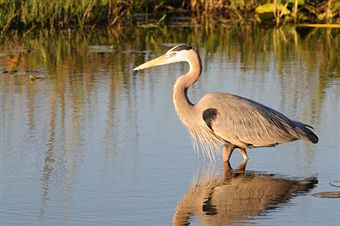
The Florida Everglades
Southern Florida stretches south, dividing the Atlantic Ocean from the Gulf of Mexico. Stretching further south is the Florida Keys. These coral islands are the southernmost part of the United States.
Since much of southern Florida is close to sea level, it is very swampy. The famous Everglades are wetlands where tall grass and bunches of trees grow. Part of these swamps has been drained for agricultural land. The soil is rich and market gardening is an important activity.
The Everglades that remain are too wet to be used for farming. The Everglades are a “river of grass.” The deeper water areas stay wet all year, but the shallower pools dry up in the dry season. Some of the water has been drained off for agricultural purposes, making the Everglades drier. Nonetheless, the best way to travel in this region is by airboats. These high boats can go through water and sail over clumps of grass.
Besides the wet grasslands, southern Florida has smaller areas of tropical forest. These areas of hardwood trees are called hammocks, and they are rich in animal and plant life. Along much of the coast are mangrove trees, which provide important nesting grounds for wild birds.
The Florida Keys stretch 200 miles from Miami southwest. These islands are tropical in climate. Fishing and tourism are important industries.
Because of its sub-tropical nature, the animal and plant life of southern Florida differs from other parts of U.S.A. Characteristic animals are alligators and crocodiles. Alligators prefer fresh water and usually live inland, while crocodiles live in salt water along the coats. Both animals are considered dangerous. Alligator wrestling is considered a sport for the brave or foolhardy.
Probably Florida is most famous for its birds. At one time, many species were almost extinct. Their long feathers were used on women’s hats. Now the law protects them. Florida has at least six species of herons, several egrets, wood storks, white ibises and cormorants. Characteristic Florida birds are the purple gallinule, the anhinga, the limpkin, flamingoes and roseate spoonbills. Many of these birds are notable for their size, colouring and interesting habits.
Notable animals include the key deer, a miniature form of the white-tailed deer. There are also panthers or cougars, bobcats, marsh rabbits, mangrove squirrels, round-tailed muskrats and the manatee.
Naturally, the Everglades are home to many reptiles. Snakes are common– both water snakes and land species. There are four poisonous varieties. Both land and sea turtles abound and lizards are fairly common.
Fishing is a major industry. Sports fishermen go to sea in search of trophies, such as marlin, sailfish and tarpon. Smaller fish are caught commercially. Fresh water sport fish include bass and gar.
After many decades of work to protect the animals and plants of the Everglades, the region finally became a National Park in 1947. It is the third largest park in the U.S.A. and covers one and a half million acres. Within the park live 300 kinds of birds, 30 kinds of mammals, 65 kinds of reptiles and amphibians, and nearly 1,000 species of flowering plants. Of course, it is a major tourist attraction.
Coral
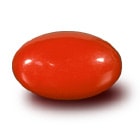
Source 1
A hard substance that is red, pink or white in colour, and that forms on the bottom of the sea from the bones of very small creatures. Coral is often used in jewellery
Coral reefs/islands
A coral necklace
Source 2
Pink or reddish-orange in colour
Bunch
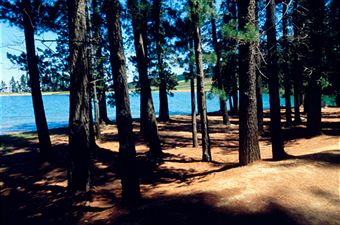
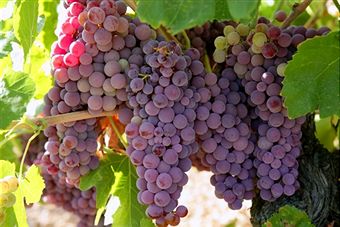
Source 1
Bunch of something a number of things of the same type which are growing or fastened together
A bunch of bananas/grapes, etc.
A bunch of keys
She picked me a bunch of flowers.
Source 2
A group of things that are fastened, held, or growing togetherbunch of I’ll send her a bunch of flowers.
He had a bunch of keys on his belt.
A bunch of grapes
Drain
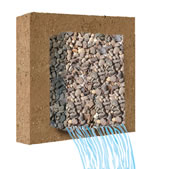
Source 1
1 [transitive, intransitive] drain (something) to make something empty or dry by removing all the liquid from it; to become empty or dry in this way
Drain and rinse the pasta.
The marshes have been drained.
You will need to drain the central heating system before you replace the radiator.
The swimming pool drains very slowly.
Leave the dishes to drain.
2 [transitive, intransitive] to make liquid flow away from something; to flow away
drain something (from/out of something)
We had to drain the oil out of the engine.
Drain something away/off Drain off the excess fat from the meat.
Drain away/offShe pulled out the plug and the water drained away.
(figurative) My anger slowly drained away.
drain into something The river drains into a lake.
drain from/out of somethingAll the colour drained from his face when I told him the news
drain of somethingHis face drained of colour.
Source 2
To make the water or liquid in something flow away: The swimming pool is drained and cleaned every winter.
Drain something from something Brad drained all the oil from the engine.
Can you drain the spaghetti, please (=pour away the water from the pan)
Clump
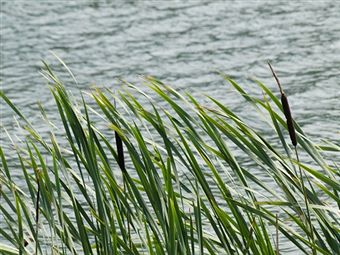
Source 1
A small group of things or people very close together, especially trees or plants; a bunch of something such as grass or hair
A clump of trees/bushes
Source 2
A group of trees, bushes, or other plants growing very close togetherclump of a thick clump of grass
In a clump The roses were planted in clumps across the park.
Hammock
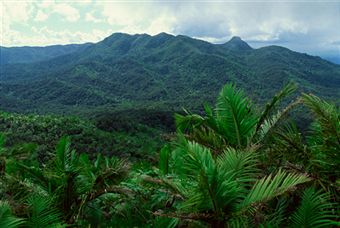
Mangrove tree
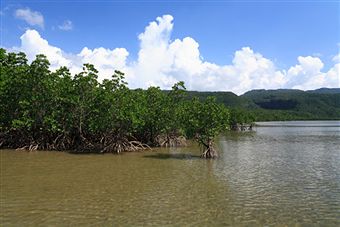
Foolhardy

Source1
Taking unnecessary risks
Synonym: reckless
It would be foolhardy to sail in weather like this.
Source 2
Taking stupid and unnecessary risks [= reckless]:
A foolhardy attempt to capture more territory
extinct

Source1
(of a type of plant, animal, etc.)
No longer in existence
An extinct species
To become extinctThe red squirrel is in danger of becoming extinct in England.
The fossilised remains of extinct animals
Source 2
An extinct type of animal or plant does not exist any more: Dinosaurs have been extinct for millions of years.
Pandas could become extinct in the wild.
An extinct species
Heron
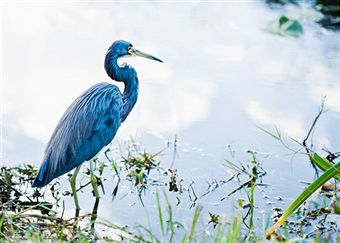
Source 1
Alarge bird with a long neck and long legs, that lives near water
Source 2
A large bird with very long legs and a long beak, that lives near water
Egret
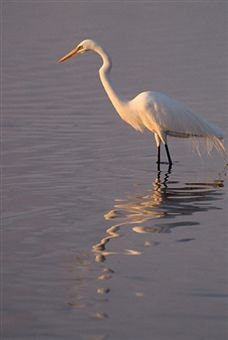
Source 1
A bird of the heron family, with long legs and long white tail feathers
Source2
A bird that lives near water and has long legs and long white tail feathers
Stork
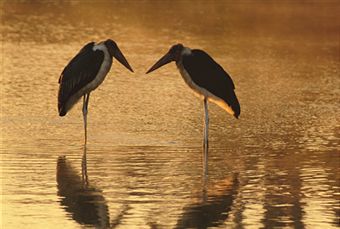
Source 1
A large black and white bird with a long beak and neck and long legs, that lives near water but often builds its nest on the top of a high building. There is a tradition that says that it is storks that bring people their new babies.
Source 2
A tall white bird with long legs and a long beak
Ibis

Source 1
a bird with a long neck, long legs and a long beak that curves downwards, that lives near water
source 2
A large bird with a long beak and long legs that is related to the stork
cormorant
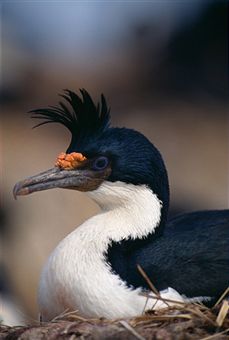
Source 1
A large black bird with a long neck that lives near the sea or other areas of water
Source 2
Alarge black sea bird which has a long neck and eats fish
Gallinule
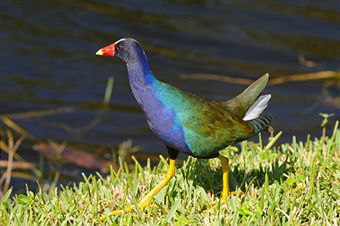
Anhinga
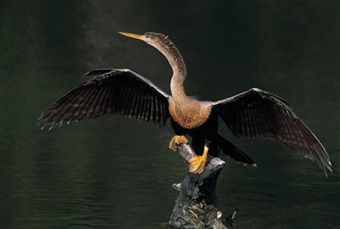
limpkin
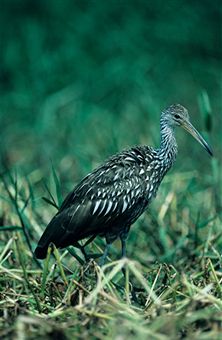
Flamingo
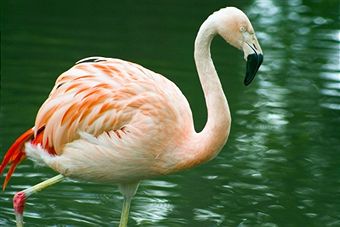
Source 1
A large pink bird with long thin legs and a long neck, that lives near water in warm countries
Source 2
Alarge pink tropical bird with very long thin legs and a long neck
Roseate
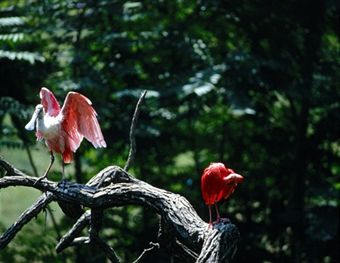
Source 1
Pink in colour
The roseate glow of dawn
Source 2
Pink:
The roseate glow of the evening sun
Spoonbill
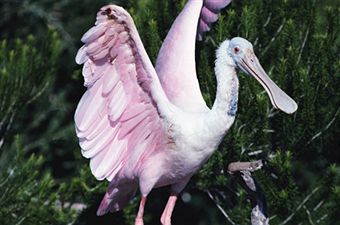
A large bird with long legs, a long neck and a beak that is wide and flat at the end
Panther
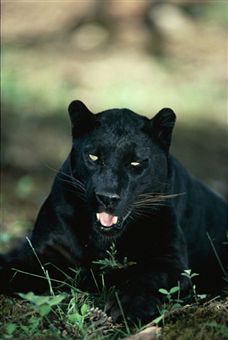
A black leopard (= a large wild animal of the cat family)
Cougar
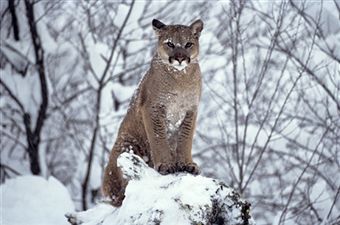
A large American wild animal of the cat family, with yellowish-brown or greyish fur
Bobcat

A N American wild cat
Marsh
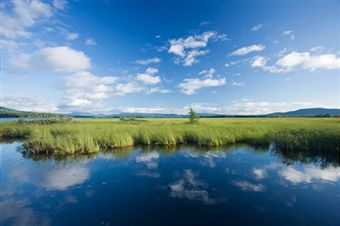
Source 1
An area of low land that is always soft and wet because there is nowhere for the water to flow away to
Cows were grazing on the marshes.
After so much rain, the field had become a marsh (= a very wet area).
Source 2
An area of low flat ground that is always wet and soft [↪ bog, swamp]
Muskrat
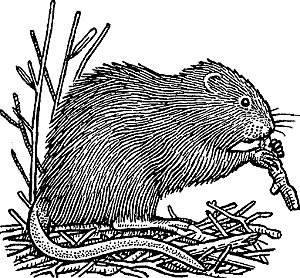
Source 1
A N American water animal that has a strong smell and is hunted for its fur
Source 2
an animal which lives in water in North America
Manatee
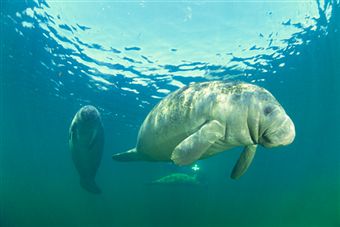
A large water animal with front legs and a strong tail but no back legs, that lives in America and Africa
Poisonous
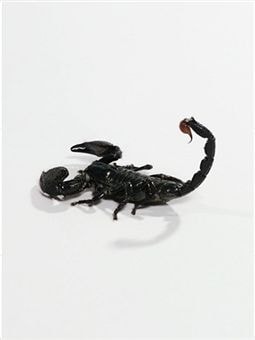
Source 1
Producing a poison that can cause death or illness if the animal or insect bites you
Synonym: venomous
Poisonous snakes
A tiny spider with a poisonous bite
Source 2
containing poison or producing poison: Some mushrooms are extremely poisonous.
poisonous gases such as hydrogen sulfide
poisonous substances
She was bitten on the ankle by a poisonous snake.
poisonous to The berries are poisonous to birds.
Trophy
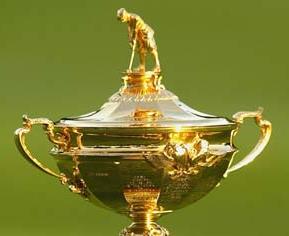
Source 1
An object such as a silver cup that is given as a prize for winning a competition
A trophy cabinet
Source 2
A large object such as a silver cup or plate that someone receives as a prize for winning a competition:
walls lined with banners and athletic trophies
Marlin
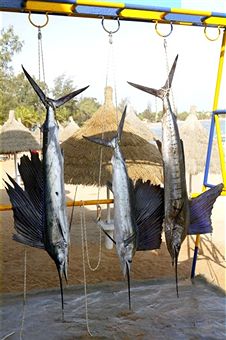
Alarge sea fish with a long sharp nose, that people catch for sport
Sailfish
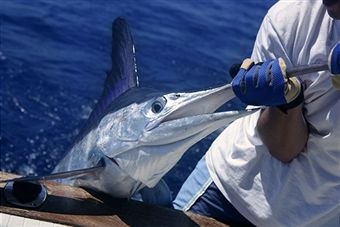
Any of a genus (Istiophorus, especially I. platypterus) of billfishes having a very large dorsal fin
Tarpon
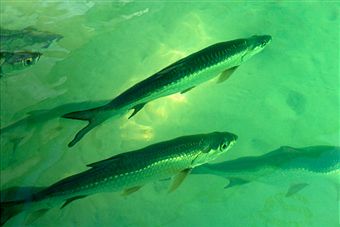
Bass
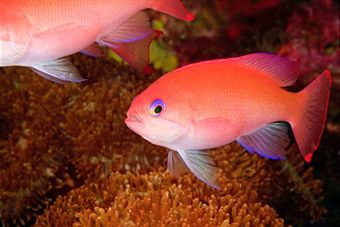
A sea or freshwater fish that is used for food
Fresh sea bass is a great delicacy.
Gar
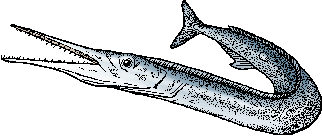
Any of various fishes that have an elongate body resembling that of a pike and long narrow jaws
amphibian
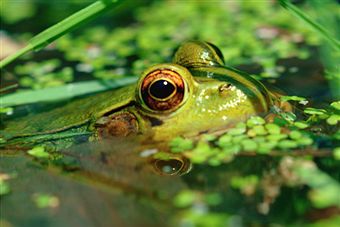
Source 1
Any animal that can live both on land and in water. Amphibians have cold blood and skin without scales. Frogs, toads and newts are all amphibians
Usage note:
The living world
Animalsanimals mate/breed/reproduce/feed (on something)
fish/amphibians swim/spawn (= lay eggs)
birds fly/migrate/nest/singinsects crawl/fly/bite/stinginsects/bees/locusts swarmbees collect/gather nectar/pollen
spiders spin/weave a web
snakes/lizards shed their skinsbears/hedgehogs/frogs hibernateinsect larvae grow/develop/pupatean egg/a chick/a larva hatchesattract/find/choose a mate
produce/release eggs/sperm
lay/fertilize/incubate/hatch eggs
inhabit a forest/a reef/the coast
mark/enter/defend (a) territory
stalk/hunt/capture/catch/kill prey
Plants and fungitrees/plants grow/bloom/blossom/flowera seed germinates/sproutsleaves/buds/roots/shoots appear/develop/formflower buds swell/opena fungus grows/spreads/colonizes somethingpollinate/fertilize a flower/plant
produce/release/spread/disperse pollen/seeds/spores
produce/bear fruit
develop/grow/form roots/shoots/leaves
provide/supply/absorb/extract/release nutrients
perform/increase/reduce photosynthesis
Bacteria and virusesbacteria/microbes/viruses grow/spread/multiplybacteria/microbes live/thrive in/on something
bacteria/microbes/viruses evolve/colonize something/cause diseasebacteria break something down/convert something (into something)a virus enters/invades something/the body
a virus mutates/evolves/replicates (itself)be infected with/contaminated with/exposed to a new strain of a virus/drug-resistant bacteria
contain/carry/harbour (especially US) harbor bacteria/a virus
kill/destroy/eliminate harmful/deadly bacteria
Source 2
Animals such as frogs that can live both on land and in water